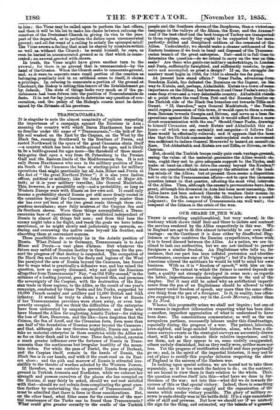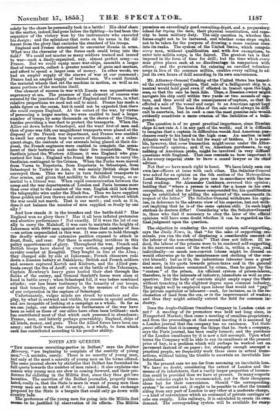OUR: SRA:RE 'IN_T-RE WAR.
Tirenr ii something unphilosophieal, but- very- natural,- iii-. the: tendency :which -shows -itself here -and-there: to isolate and contrast:
the-services rendered by tlie_Allies- respectively-in this war. Wir: in--England •are:apt-to dri.this-aliaost invariably to our own' &Soak- vantage : otrthe- Continent- it -done- either- by disaffected • Efitg- liihmen or: their- confreres the. Russian- sympathizers; whose:wisk it'is to breed -discord-between-the-Allies. As a-nation, we are, in- clined to -lash our authorities, but-we- are- not: inclined' to permit-- foreigners a similar freedom. An- Englishmatrwho_ telli: us; for instance, that our-part has been inflated pretension • andaberttke' performance, exercises-one of his .mrights" ; .but if a Belgiaireamn- American uttered- the antithesis -he-wotdcLbe -told to mind-ilia-own business: With us. " freedom- of 'speech'," with hint iii pertinence. The-exten -to:which the formeris:carried-dependi-on-, taste, a qnality-not strongly--developed in= some men-; -as-regarerrst- the latter,- impertinence remains: impertinence: to the end of the! chapter; But' it- may still be_ asked Why-an antithetical' iropertii nence from-the-pen-of an Englishmtur should be' allowed tutaker sanctuary-under freedom of speech, anymore than- the same-offen- sive thing-from the-pen-of- uforeigner; II it; in-reality; lessofffin, she supposingit to appear, say-in the:Leeds Mercury, rather than in-Le Nord: - Whence this propensity-arises we-shall. not' inquire ;-but onkof itscausesikininerfect- information. respecting-what-has been thine_ —another; imperfect% appreciation of whatie-tmderstood-to- have' been done. The conscientious commentator; as well as the. net scrupulous partisan; necessarily labours -under this disadiantage; especially during_ the progress- of a- war: The-patient; laborious;- keen-sighted; andlargeminded historian, alone, who from udia. Mum surveys:events-as the strategist surveys alraccuratelrliawa chart; will be able to estimate their- relative: iMportance, andto: see them, not as- they appear to ns, some unduly- exaggerated; others unduly-diminished, but 'as-they-really--were, neither more-nor less. Yetthe progress of rectification- should and does perpetually- go-on-; andi_in the-spirit-of the impartial historian, it may notbe out-oft...race to rectify-this popular -delusion- respecting the share'. of En and in the ace
nossuof.the :Eastern war.
Inooking.-upan-special actions, we are bound-not-to take therm separately, as-it is - too_mnoh-the-fashion- to dal on the contrary,. we-are bound:to view- them_ in-their-relation- to the whole. Thus; the coestion resolves itself into this—what-have-we: done- hr-fer:- therance of the war; not- into this—what-did we do-towards the success of- this orthatspecial Victory: Indeed; there is something: that underlies victory—thee supply and- the- organization of-the means which render-victory-possible: The glory of-military re- nown- is imdoubtedly won- in the battle-field: It-is a sign-immistake able of skill and prowess. But -how we should err if we mistook: the sign-for-the thing, and estimated, say the talents of a:genera,
solely by the share he personally took in a battle! His chief share in the matter, indeed, had gone before the fighting—he had been the organizer of the victory won by the instruments- who executed his design ; and the splendour. that rests on his name is far dif- ferent from the glory that encircles the standard of his troops. England and France determined to encounter Russia, in. arms. What was the character of the forces each could bring into the field ? We could not muster so many soldiers trained and. inured', to war—sneh a finely-organized, nay, almost perfect army—as. France. But we could equip more war-ships, assemble a larger fleet.of transports, collect a greater number of guns and mortars, ; andafford to spend a larger sum of money. In other words, we had an ampler supply of the sinews of war at our- command ; France had an ampler supply of trained men. We could furnish_ the material wheels that set. the machine in motion, as well aa no..,L mean portions of the machine itself. One element of success in--war with Russia. was- unquestionable supremacy at sea. The presence of that- element of somas .was:
secured by the junctionof:the fleets of England and France, in.what relative proportions we need not call to mind. France has males.; noble figure on the ocean, but it.could not be expedited that them she could surpass England. At the outset of the war, by virtue- of possessing a larger marine; we-were enabled to land a larger number of troops. by some thousands on the shores of • the Crimea., besides providing a war-fleet. to protect the transports. When.the Allies sat down before Sebastopol, and the want firstof men and, then- of-guns was felt; our magnificent transports were placed ;Atha disposal of the French war -department, and France was- enabled' to swell her army from tens to scores of thousands ; at- a subset quent.stage, the contents of. our arsenals being, plaoecLattheir. dis- posal the French engineers were- enabled. to complete the arms:• ment- of their batteries and make their fire irresistible. When.
Sardinia joined the Western Affiance, it was. England who gua- ranteed her ban ; England who found the transports to carry the. Sardinian contingent to the Crimea. When the Turks were moved, from. Varna to Eupatoria, from- Eupatoria to Sebastopol, from
Sebastopol to Thrkey in Asia, it was mainly: British ships that- conveyed them. Thus we have in turn famished transports to - four armies, and- given that mobility to the Allied troops,. so es-
sential to a littoral war. When rapid communication between the camp and the war . departmentaof don. and park- beeame. more than ever vital to the conduct of the war, English skill laid •down.
the telegraphic-wire under-the Black Sea. Thus we have supplied those golden and iron thewes and!sinews of -warfare without which
the war: could not march. That is our merit.; and: such. as. it.is, does.-it not balance. the number of men supplied: so freely hy oar. y P all
Andhow stands- it in the trenches and the battle-field •P,' Hew England won no glory there P Has it all been inflated pretension and abortive performance ? Not exactly. If it were the lot of our allilerto. carry the Malakoff, it was ours to maintain.the heights. of.i men with 8000 men against seven times that number of. foes..
—enaction unparalleled in this war. It wa&ours•tohold-through: the deadly winter- our extensive position exposed to attack in front, flank, and-rear. But there is something invidious in this- paltry apportionment. of glory. Throughout the war,. French and British troops have shared in every action,. except perhapathe cavalry combat at Koughill. They fought in line at the Alma ; they charged side. by, side. at -Inkerman ; French chasseurs rode down-a.liassian battery at Balaklava; -British and,French soldiers, and-seamen. captured Kertch and Kinburn, and the Allied gun- lioataswept.the Sea of Azoff.; even at the battle of.the Teherns.ya, Captain Mowbray's heavy guns hurled their' shot through the flanks of the enemy, and General: Soarlett's. horse were close. at hand in battle array ; when Sebastopol fell, it was before combined attacks;- our loss bears testimony to the tenacity of our troops, and that tenacity; not. our. failure, is- the measure of the value of our cooperation in the- capture:of Sebaiitopol:
Unfortunately,. vulgar minds are struck by numbers and dis-
by what-is outward-and visible, by success in special actions, can incapable of looking at. a. campaign as a whole. So. far as. we can- judge, . our achievements in furtherance of the war have been as solid as those of our allies have often been brilliant: each. has contributed- most of. that which each possessed in abundance-;, France, men, and latterly perhaps generalship ; England; ships of
aRkinds,,money, and guns. Thus the Allied have been one army; and their work, the campaign, is a-whole, to. form which. each has contributed according to his peculiar.ability.



































 Previous page
Previous page